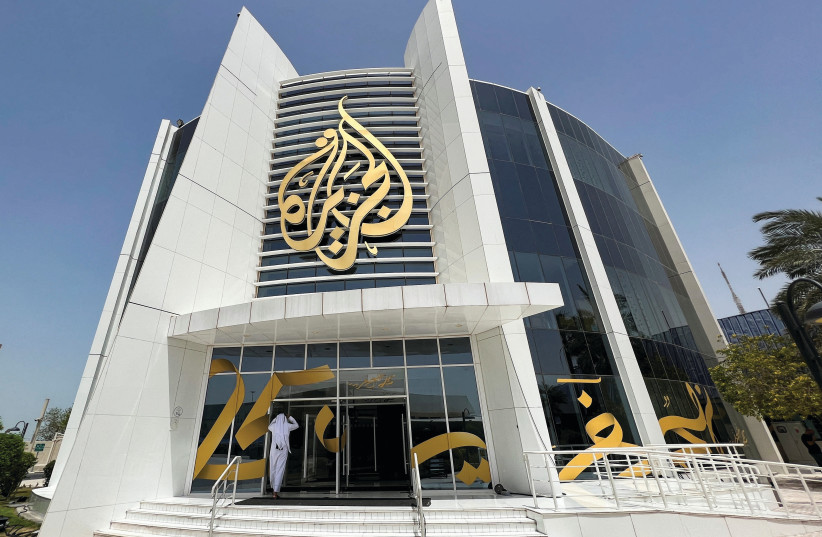Choose the slew of media sites of any country in the Middle East, you will rarely if ever hear, see or find criticism of the government under which they operate.
When the Western media were full of reports that assailed the Qatari authorities for their mistreatment of foreign workers who built the World Cup sport facilities, Al Jazeera, in both English and Arabic, was busy assailing its usual culprit, Israel, without even a hint that anything was rotten in Qatar itself.
In Egypt, the al-Ahram conglomerate reports only government achievements even as Saudi and UAE loans and IMF credit facilities bail out a very troubled economy. Even more unthinkable is to criticize in any way, President al-Sisi, who secured his position in a military coup. The same is true of Saudi, UAE, Moroccan, or Algerian media.
No one in the Saudi media would dare question why Saudi Arabia is not cooperating with the United States and Britain in confronting the Houthi attacks on maritime traffic in the Red Sea – a more vital security interest for the Saudis than for either the United States or Great Britain. Palestinian media emanating from either Jerusalem or from the Palestinian Authority will never address the issue of corruption in government and even less the issue why the leader at its helm has to continue ruling after 20 years uncontested in any credible elections.
Where media can criticize the government
There are only two countries in the Middle East, Lebanon and Israel, where government is criticized in the media and only one, in Israel, where government bashing is the norm rather than the exception.

Ironically, Israel government-bashing is especially prevalent among the downtrodden Palestinians, either those living under “occupation,” or the media sites run by Israel’s Arab citizens. In general, the Arab media – that never criticizes its leadership or governments – views the Palestinians to be living under an occupation of ethnic cleansing, in Gaza they are exposed to wholesale annihilation, and within Israel proper, its Arab population are second- or third-class citizens.
Officially, Israel has a government censorship office to monitor media reporting. One would hardly imagine it exists from reading and viewing one of the most popular and formerly staid media sites – al-Quds, which operates out of Jerusalem, but has a readership mainly in the Palestinian Authority.
Looking at the headlines of the media site on August 27 is just about as good as any place to get a taste of the Israeli bashing the media site promotes. The leading news item deals with the 23rd anniversary of “martyr Abu Ali Mustafa,” the leader of the brutal Popular Front for the Liberation of Palestine. He was killed in a pin-point Israeli airstrike for his intense involvement in the movement’s terrorist activities.
THE NEXT news item is titled “The government will fund settler incursions into al-Aqsa for the first time” only to be followed by a news item that “the occupation demolished a house south of al-Aqsa Mosque.” What the Israeli media would report as the killing of five terrorists in an IDF raid on Nur Shams refugee camp (near Tulkarm), is transformed into “the assassination of five Palestinians by the occupation.” Gaza also figures prominently in the media site as it reports: “Martyrs and wounded in a series of occupation raids on several areas in the Gaza Strip.”
Israel hardly fares better in the op-eds. An especially prolific opinion-maker and politician, Mustafa Barghouti, begins his assail with these words: “How many times are our hearts rent seeing the corpses of children in Gaza torn apart by the bombs of the occupation army, hearing the bitter wails of mothers who lost their children, amongst them 115 children who died soon after they were born during the continuous animalistic aggression…
There is no doubt that the Arab Israeli press is far more focused on internal issues and more moderate in tone, but “freedom of the press” is easily found in these media outlets as well. A veteran media site, Kul al-’Arab, as did its counterpart in east Jerusalem, al-Quds, reported prominently on the funding of “the campaigns to storm al-Aqsa mosque” with the assent of “extremist Ben-Gvir.” Israeli Arab media, following the lead of Hamas and Islamic Jihad, refer to the Temple Mount exclusively as al-Aqsa mosque, effacing any reference to the former term for the Temple Mount, Jabal al-Haikal, (the Temple Mount in Arabic) that links the place to the first and second Jewish Temples of the past.
In neither the Palestinian nor Israeli Arab media will you find almost anything positive about Israel – its technological, scientific and medical achievements, academic research in religion and the humanities, including the world of Islam, or in sports.
Above all, they are never struck by the irony that they can bitterly oppose, mobilize and vent hatred towards only one government, its leaders, officials and its citizens, which they never could or dare towards any other government in the Middle East.
Freedom of the press, in the Middle East at least, is almost exclusively “made in Israel,” especially regarding the Palestinians.
The writer is a senior researcher at the Jerusalem Institute for Strategy and Security, and professor (emeritus), Bar-Ilan University.
